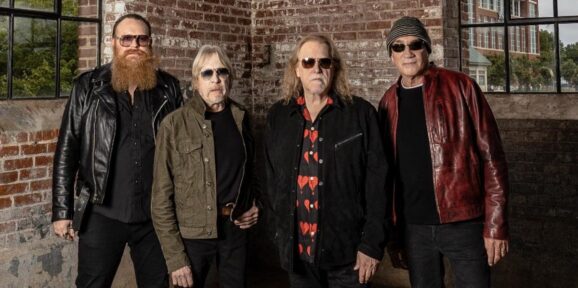The valid fascination with the Grateful Dead’s 1977 activities continues with the release of Dave’s Picks Volume 33. This latest issue in the ongoing vault series follows in the footsteps of 2009’s To Terrapin and, of course, Cornell ’77 (and its attendant box set May 1977: Get Shown the Light) with a fall tour show recorded by Betty Cantor-Jackson.
In his essay inside this twelve-page booklet, David Lemieux expounds upon the technical expertise of engineer Jeffrey Norman and the results of his efforts, i.e., ‘…it sounds as good as it possibly can and better than any of us have ever heard it…’ But it mystifies somewhat the chief archivist doesn’t extend comparable praise for the distaff recordist’s own well-honed skills; like most any other examples of her work, it is an experience unto itself to hear the what Cantor-Jackson captured on tape from this autumn evening: all the instruments are finely balanced, in proper relation to each other and in their respective registers.
So. with nary a lapse in the audio realism, it’s readily-discernible how, at this juncture of its career, the Grateful Dead on stage was moving as a limber ensemble that refused to waste a note. Drummer Bill Kreutzmann’s interplay with his rhythm comrade Mickey Hart is sure and sharp throughout, alternately providing the appropriate emphasis within the quiet balladry of “It Must Have Been the Roses” as well as injecting plenty of snap into “Bertha.” In their respective roles as pianist and vocalist, Keith and Donna Godchaux contribute handsomely during “Ramble On Rose,” while the main instrumental axis of the septet, guitarist Jerry Garcia and bassist Phil Lesh, engage in some fiery interplay for “Let It Grow.”
Released in late July of ’77, Terrapin Station was begun the year before and took upwards of six months to complete under the aegis of producer Keith Olsen (of Buckingham-Nicks Fleetwood Mac comeback fame, as designated by their label Arista Records.). On the one hand, those stress-fraught sessions may be the reason for the notable absence of material from the record at this show, except for a pair of durable compositions fronted by Bob Weir, “Samson and Delilah” and “Estimated Prophet.”Yet the discipline upon which the group had to call for the aforementioned ninth Grateful Dead studio album may very well be the source of the economy of their musicianship.
Even so, the restraint of their instrumental interactions didn’t preclude choosing a wide range of material. “St. Stephen” from 1969’s Aoxomoxoa functions as the fulcrum of a suite that otherwise includes disparate selections off Wake of the Flood (“Eyes of the World”) and Workingman’s Dead (“Black Peter”). And this exercise in collective courage ultimately pays off by the end of the show: ratcheting up the intensity via “Not Fade Away,” the group then vaults to a frenzied close of “Sugar Magnolia” and “One More Saturday Night.” Within this extended interval, the insertion of “Space” adds to the suspense of the segues. And even if not all the well-known pieces are radically reinvented, like this deliciously slow arrangement of “Friend of the Devil,” familiar material such as “El Paso” becomes a welcome point of stability within the overall drama of this setlist as it unfolds.
By the time Dave’s Picks Volume 33 crashes to a close on the third CD, the thought occurs the band could not have reached this joyfully cacophonous conclusion by any other route (interestingly, listen close at the end of disc two for the discussion of the ensuing song selection). And the bonafide level of excellence in the Grateful Dead’s performance finds its corollary in the taping through which Betty Cantor-Jackson preserved this concert for posterity.









